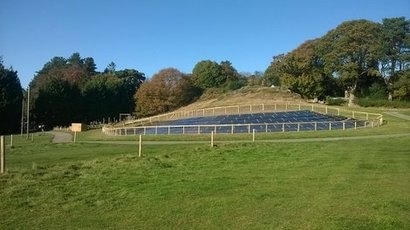
The 50 kW solar array, at Bodnant Garden in the Conwy Valley, was successful in the category of national small scale project of the year at the energy efficiency and retrofit awards in Birmingham. It generates around 43,000 kWh of electricity at the site which sees over 200,000 visitors each year and powers the on-site Pavilion Café along with two electric vehicle charging points in the neighbouring car park as well recharging the batteries of power tools used in the gardens.
The array consists of 175 panels, laid on a curve in the hillside. The panels were supplied by Panasonic as part of its partnership with the National Trust and the money saved from energy bills will directly fund the trust’s conservation work.
“Every trust property has its own unique spirit, and we’ve got to make sure that whatever we install is appropriate in the right place” said Paul Southall, environmental advisor at the National Trust. “Bodnant Garden has had 212,000 visitors this year and when the sun is shining our visitors are here so this system makes a perfect match. The success of this scheme is down to the collaborative approach between the property staff, the designer and installer Carbonzero renewables, and the team at Panasonic, who all worked to ensure the finished system sat appropriately within its environment.”
Louise Hirst, Panasonic key accounts manager, added that Panasonic are grateful for the opportunity to collaborate on the renewable energy project at Bodnant Gardens with The National Trust and that the project has been a great success. It demonstrates that historical and challenging sites can be successfully and sensitively converted to renewable energy in order for National Trust's energy efficiency goals to be realised. Panasonic values the opportunity to play a part in the preservation of the UK’s heritage and hopes to be involved in many more projects moving forward.
The trust is also undertaking a £33 million Renewable Energy Investment (REI) Programme, supported by the charity’s renewable energy partner Good Energy, to develop over 40 renewables projects across the country involving heat pumps, biomass and solar power, to help generate 50 per cent of its energy from renewable sources by 2020.
It also recently replaced oil-fired heating systems with biomass at Killerton House, Devon and Nunnington Hall, on the cusp of the North Yorkshire moors. A hydro-powered scheme near Bethesda in Snowdonia will produce enough electricity to supply 121 homes for a year, offsetting 246 tonnes of CO2.
Image: The National Trust
For additional information:

